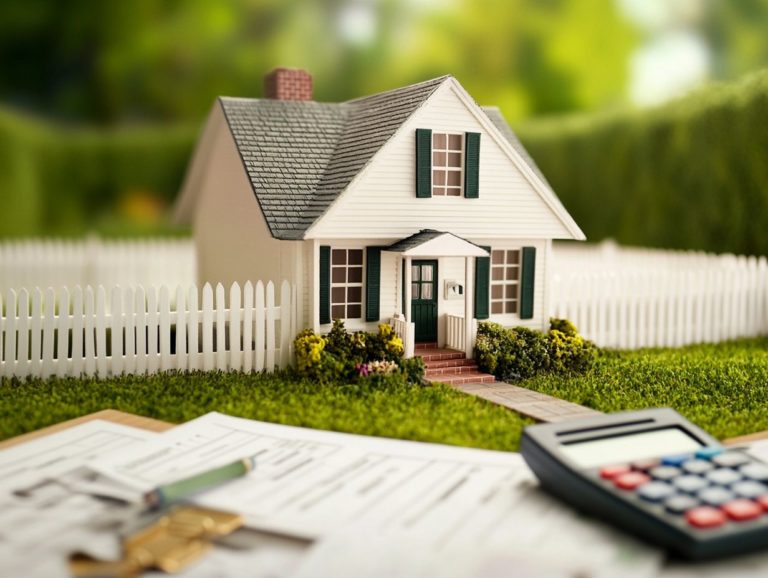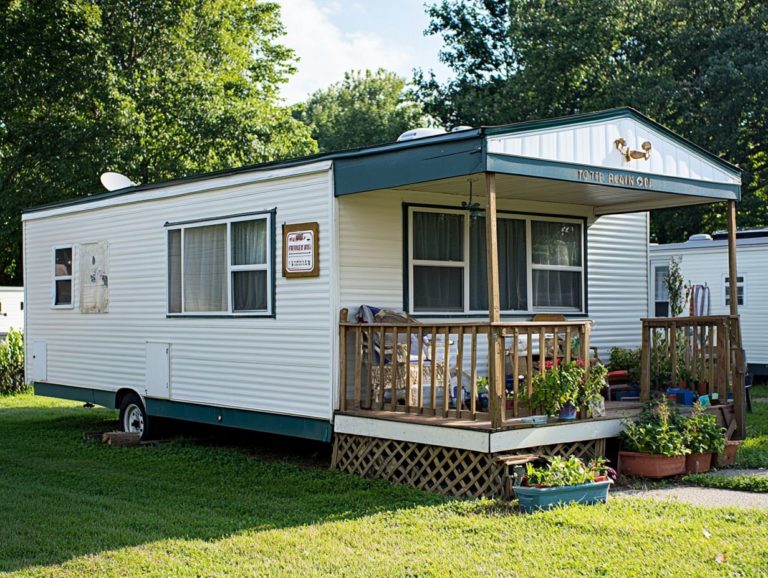Home Insurance Types That Cover Natural Disasters
Natural disasters can strike without warning, unleashing devastation and putting your home in jeopardy.
As a homeowner, understanding the types of natural disasters and their potential impact is essential. This guide clearly explains the various home insurance coverages available, ranging from basic policies to tailored options designed for specific risks.
You ll also discover how to evaluate your vulnerability, select the appropriate coverage, and effectively prepare your home for unexpected events. Equip yourself with the insights needed to protect both your home and your peace of mind.
Contents
- Key Takeaways:
- Protect Your Home: Understand Natural Disasters and Insurance
- Types of Home Insurance Coverage for Natural Disasters
- Assessing Your Risk for Natural Disasters
- Choosing the Right Home Insurance Coverage
- Preparing Your Home for Natural Disasters
- Be Prepared: Essential Tips for Natural Disasters
- Frequently Asked Questions
- What are the different types of home insurance that cover natural disasters?
- Does homeowners insurance cover natural disasters?
- What natural disasters are covered by renters insurance?
- How can I determine if my home insurance covers natural disasters?
- Is there a limit to how much coverage I can get for natural disasters through my home insurance?
Key Takeaways:
- Basic home insurance policies may not cover all types of natural disasters, making additional coverage options necessary for full protection.
- Factors such as location, construction type, and previous disaster history can impact the risk of natural disasters for your home, making it important to assess and understand your risk.
- Before a natural disaster strikes, take preventive measures and properly prepare your home to minimize potential damage and ensure safety for you and your family.
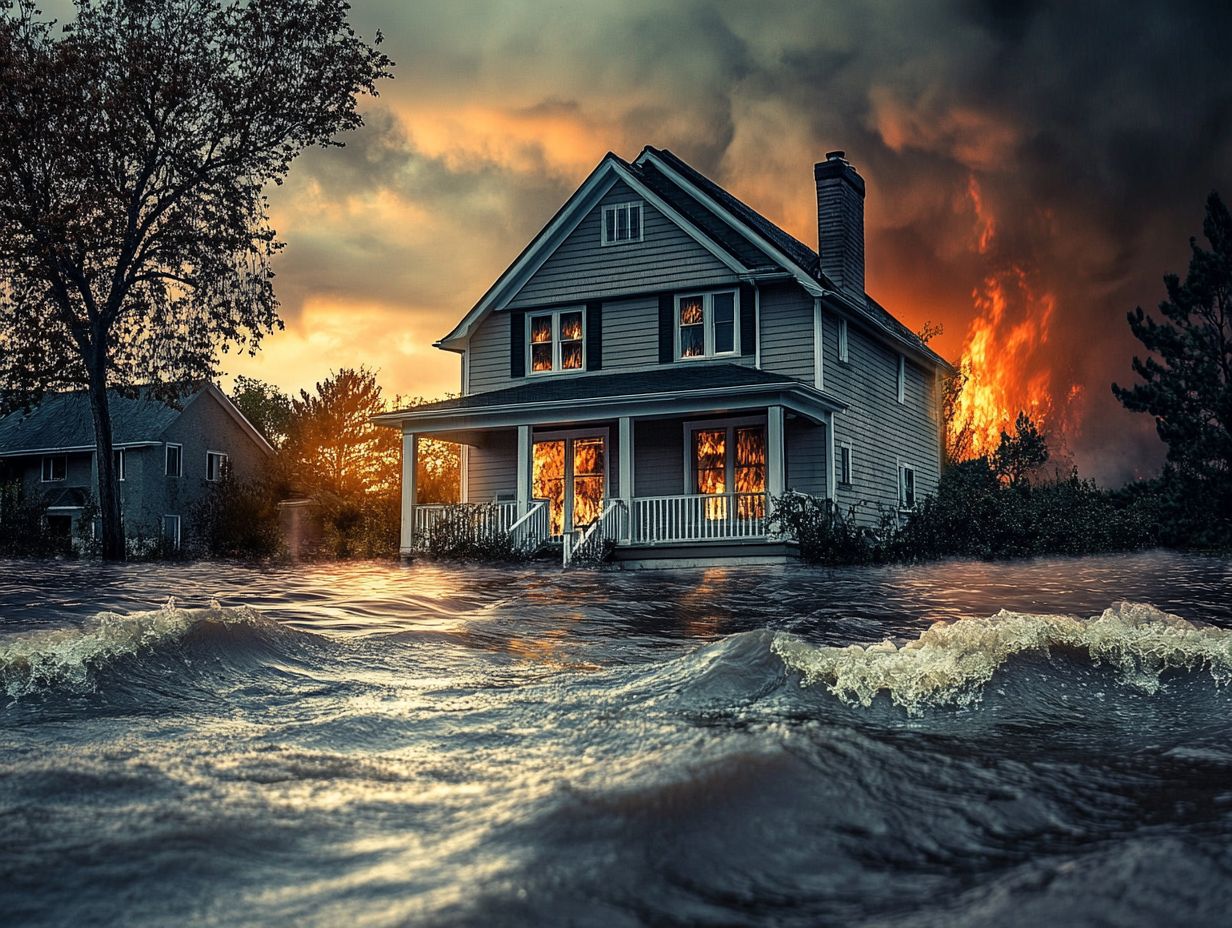
Protect Your Home: Understand Natural Disasters and Insurance
Understanding the relationship between home insurance and natural disasters is vital for homeowners like you who are seeking robust financial protection and comprehensive coverage options.
Natural disasters—think hurricanes, tornadoes, wildfires, and floods—can cause substantial property damage, making it essential to consider the top considerations for home insurance types when selecting good homeowner insurance policies.
It’s important to understand policy exclusions, including disaster deductibles. A deductible is the amount you pay out of pocket before insurance kicks in, and the invaluable role that insurance agents play in guiding you through the claims process. This knowledge gives you the power to assess risks effectively and secure the best coverage solutions available.
Defining Natural Disasters and Their Impact on Homes
Natural disasters are catastrophic events stemming from the Earth s natural processes, resulting in significant property damage and loss of life. It’s vital for you, as a homeowner, to grasp the gravity of these events.
Understanding the various types of natural disasters hurricanes, tornadoes, floods, and earthquakes is essential for effectively preparing for their impact.
For example, hurricanes can unleash winds exceeding 150 mph, leading to extensive structural damage and flooding, as highlighted by the National Oceanic and Atmospheric Administration (NOAA). Tornadoes, which can strike with little warning, have the power to obliterate entire neighborhoods in mere minutes, showcasing their unpredictable nature.
Similarly, floods can wreak havoc on communities; the World Health Organization (WHO) has documented the increased health risks and potential displacement that often accompany such events.
As these occurrences become more frequent due to climate change, it is crucial for you to prioritize obtaining comprehensive insurance policies. This proactive measure can help mitigate financial losses and ensure a swift recovery when disaster strikes.
Types of Home Insurance Coverage for Natural Disasters
When navigating the realm of home insurance, it’s essential for you to understand the differences in home insurance types, especially coverage options tailored for natural disasters. This understanding is crucial for securing the financial protection you need against unforeseen events.
Basic Home Insurance Policies
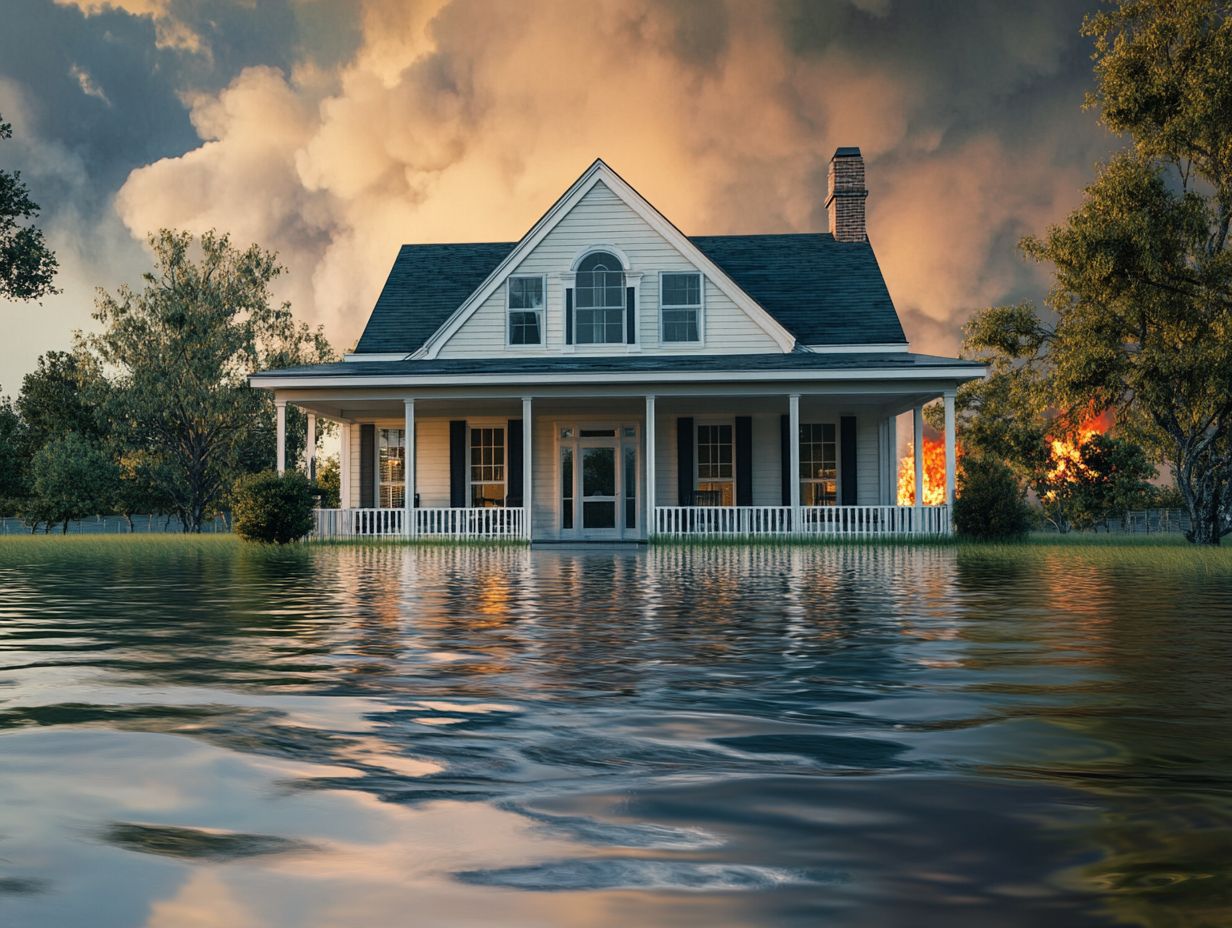
Basic home insurance policies, often referred to as homeowners insurance, typically offer coverage for a variety of perils. It s important to be aware of any specific exclusions that may apply to your policy.
Understanding these essentials is vital for safeguarding your investment and ensuring you have adequate protection against unforeseen damages. Generally, standard coverage might encompass protection against theft, fire, and certain types of water damage; however, be mindful that natural disasters like earthquakes and floods are frequently excluded. For more details, refer to our guide on understanding the perils in home insurance types, which may require separate policies or endorsements.
It’s essential for you to regularly review your insurance premiums and assess coverage options based on the risks specific to your region, as different areas may be more prone to certain natural occurrences. Staying informed allows you to tailor your coverage, securing both your property and your peace of mind.
Don t wait until it s too late! Assess your current insurance and make necessary changes to your policies today!
Additional Coverage Options
In addition to your standard homeowners insurance, consider securing additional coverage options like flood insurance and earthquake insurance, especially if you reside in high-risk areas.
It’s essential for you to regularly assess your risk levels to ensure you have the protection you need against unpredictable events. Understanding how disaster deductibles work can change the way you approach claims, as these deductibles can significantly impact your out-of-pocket expenses during a claim.
In these scenarios, insurance agents become invaluable allies. They offer expert guidance, helping you navigate the intricate landscape of additional coverage. They can identify your specific vulnerabilities and recommend tailored insurance solutions that align with your individual needs, granting you peace of mind amid uncertainty.
Assessing Your Risk for Natural Disasters
Assessing your risk for natural disasters is a crucial step in choosing the right homeowners insurance. This evaluation helps you understand the level of financial protection necessary to safeguard against potential threats.
By taking this proactive approach, you can make informed decisions that ensure your home and assets are well-protected.
What Affects Your Risk of Natural Disasters?
Several factors play a crucial role in determining the risk of natural disasters for you, including your geographic location, local weather trends, and the age and condition of your home.
These elements can heavily influence your chances of facing events like floods, wildfires, or hurricanes. For example, if your home is in a flood-prone area, you might find yourself paying higher insurance premiums compared to a property in a more secure location.
Outdated building materials and designs can jeopardize your home s resilience, leading to even higher costs. It’s wise for you to regularly assess your financial protection needs by evaluating these risks in light of your unique circumstances.
By taking these steps, you can make informed decisions that will help safeguard your investments against potential disasters.
Choosing the Right Home Insurance Coverage
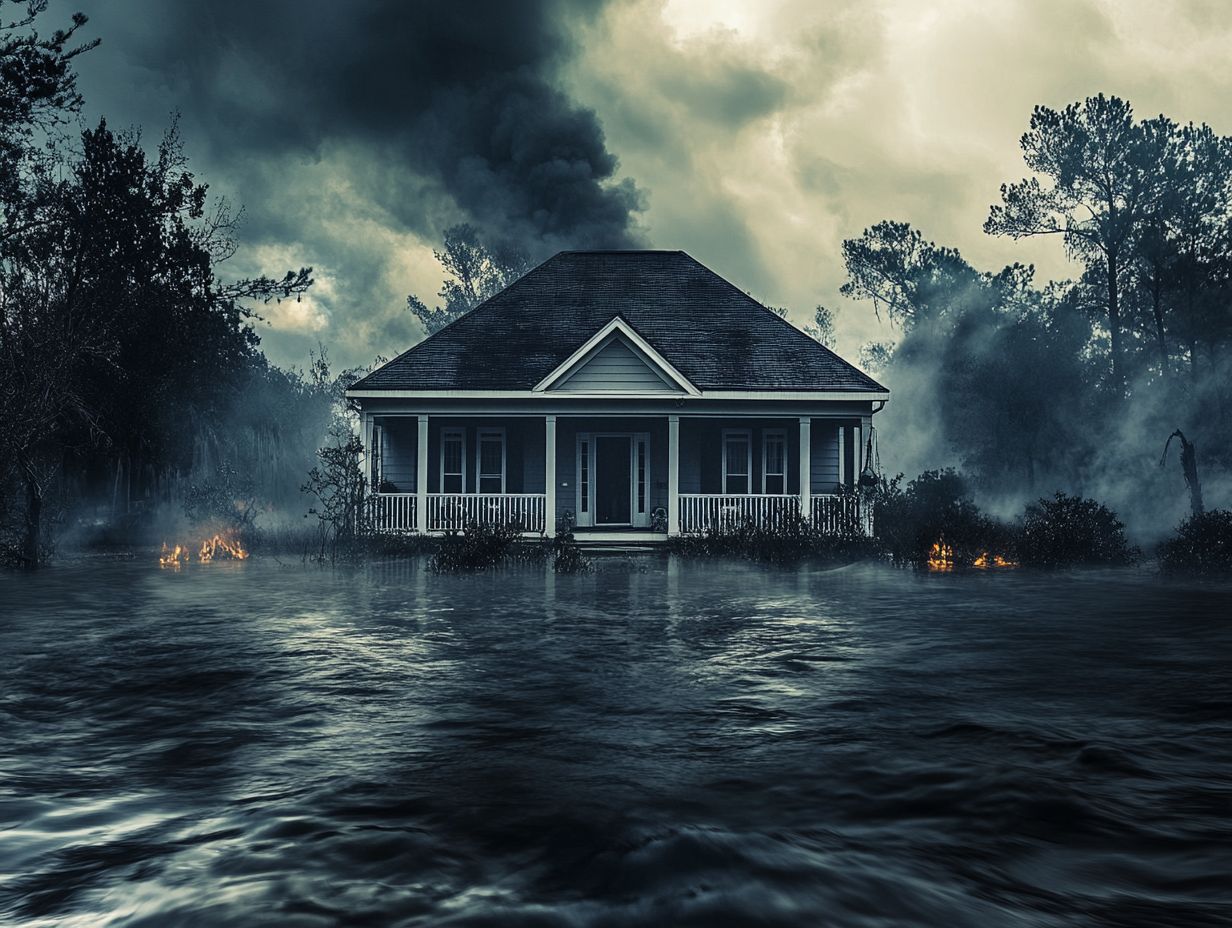
Selecting the right home insurance coverage is a pivotal choice that profoundly affects your financial security in the face of natural disasters and unexpected occurrences. It’s crucial for you to comprehend the diverse coverage options available, as well as any policy exclusions, to ensure you are adequately protected.
Factors to Consider
When selecting home insurance coverage, factors such as coverage options, insurance premiums, and risk assessment are crucial for ensuring you have the financial protection you need. Understanding these elements gives you the power to make informed decisions tailored to your unique circumstances.
For example, when evaluating different coverage options, consider policies that protect not just the structure of your home but also your personal belongings and liability. Keep in mind that insurance premiums can vary based on the level of coverage and your location, so it s wise to carefully review how these costs fit into your overall budget.
Conducting a thorough risk assessment will help you identify potential vulnerabilities in your property, ultimately guiding your choice of policy. To navigate these complexities effectively, gather multiple quotes and meticulously read through the fine print, ensuring that the policy you choose truly aligns with your specific needs.
Preparing Your Home for Natural Disasters
Get ready to protect your home and loved ones by taking proactive steps against natural disasters. By implementing preventive measures and assembling a well-thought-out emergency kit, you can significantly reduce the impact of these events and ensure the safety of your family in times of crisis.
Don t wait until it s too late secure your home today. Contact an insurance agent to discuss your options and find the coverage that best meets your needs.
Be Prepared: Essential Tips for Natural Disasters
Implementing effective preventive measures and assembling a thoughtfully curated emergency kit are crucial steps in safeguarding your home and family from the potential devastation of natural disasters.
An emergency kit should include essential items such as food, water, first aid supplies, flashlights, and important documents.
You can start by reinforcing your roofs and windows to withstand the high winds that storms can bring. Ensure your gutters and drains are clear to prevent flooding. Installing smoke detectors and carbon monoxide alarms will help you detect hazards early, giving you peace of mind.
This level of preparedness not only alleviates stress but can drastically improve your response times during crises. This allows for a smoother transition to safety and recovery.
Don t wait until it s too late! Start preparing now to protect your home and loved ones.
Frequently Asked Questions
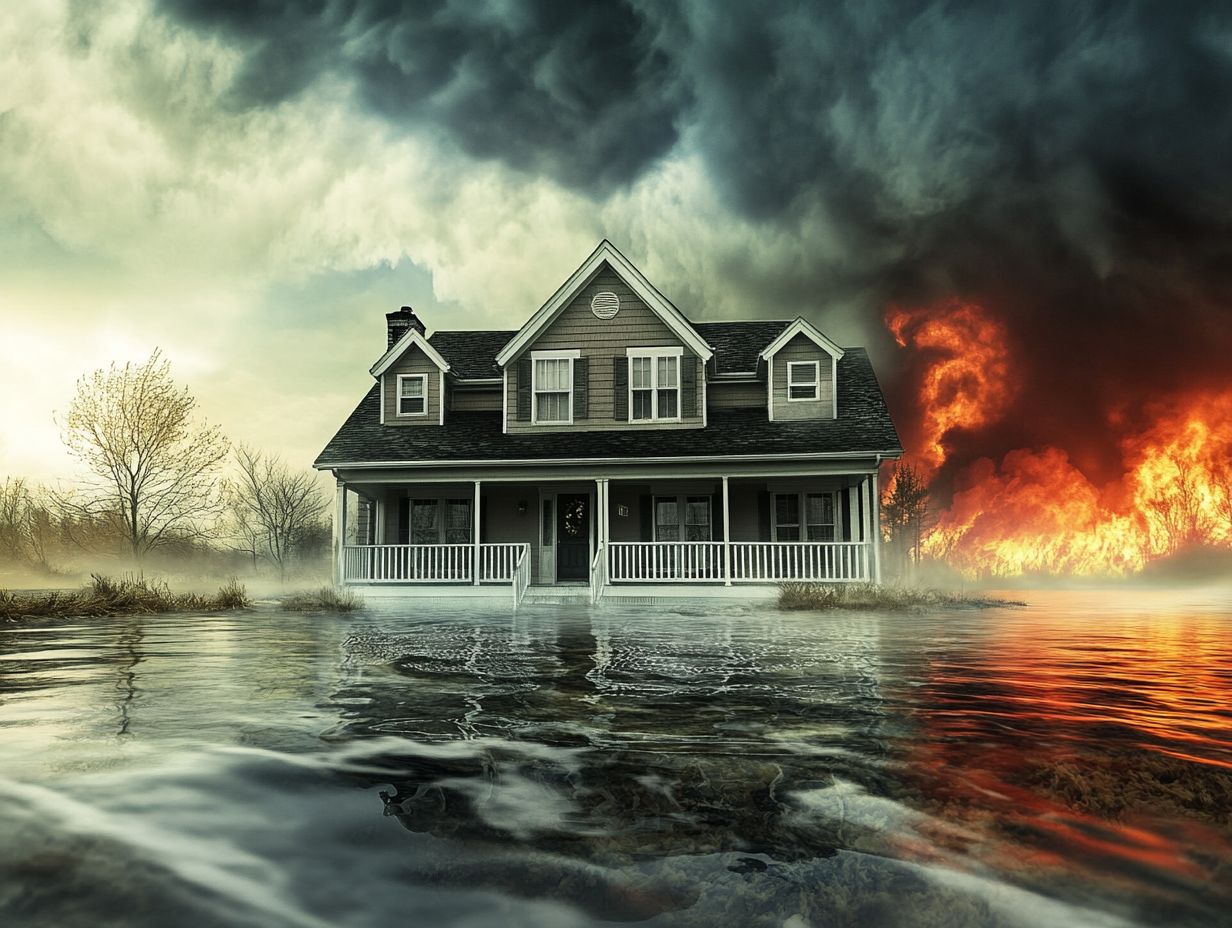
What are the different types of home insurance that cover natural disasters?
The most common types of home insurance include homeowners insurance, renters insurance, and condominium insurance. For a deeper understanding of the various options, check out the different types of coverage in homeowners insurance, which can also be supplemented with flood insurance or earthquake insurance.
Does homeowners insurance cover natural disasters?
Yes, homeowners insurance typically covers natural disasters such as hurricanes, tornadoes, and wildfires. However, for high-value properties, it’s important to explore home insurance types that may offer additional coverage options, as coverage for floods and earthquakes may require separate policies.
What natural disasters are covered by renters insurance?
Renters insurance may cover natural disasters like fires, lightning strikes, and windstorms. It may also cover damages caused by burst pipes, vandalism, and theft. However, it’s important to understand the impact of natural disasters on home insurance, as floods and earthquakes are generally not included.
How can I determine if my home insurance covers natural disasters?
You can review your home insurance policy to see if natural disasters are listed as covered dangers. If you are unsure, find out the types of home insurance coverage by contacting your insurance provider for more information about your coverage.
Is there a limit to how much coverage I can get for natural disasters through my home insurance?
Yes, there are usually limits on the coverage for natural disasters through home insurance. These limits may vary depending on the type of disaster and your specific policy. To better understand these limitations, refer to understanding the limits of home insurance types. Review your policy and speak with your insurance provider to ensure you have adequate coverage.

